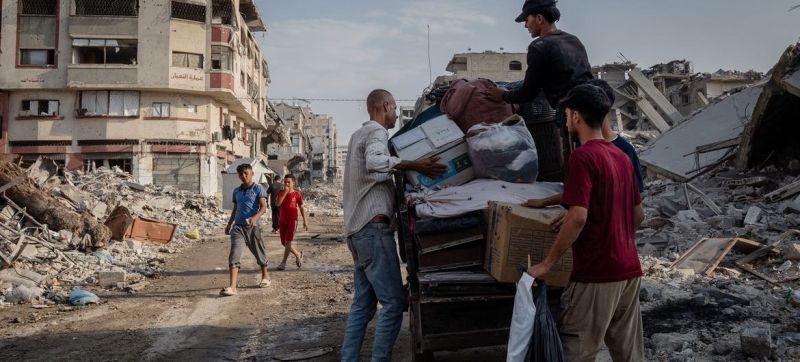- Irregular entry, false asylum claims harm Bangladesh’s global standing |
- Dhaka breathes ‘very unhealthy’ air Tuesday morning |
- Election Code of conduct gazetted, banning posters-drones, AI misuse |
- Rivers Keep Swallowing Land as Bangladesh Battles Erosion |
- UN Warns Refugees Caught in Climate–Conflict Cycle |
Gazans Return Home as UN Warns Ceasefire Remains Fragile

Men load possessions onto a cart in the al-Naser area of Gaza City.
A month into the ceasefire in Gaza, families continue to slowly return to their former homes and communities wherever access is allowed, the UN agency that assists Palestine refugees, UNRWA, said on Monday.
Staff remain on the ground providing lifesaving services, and around 100 UNRWA shelters are housing more than 75,000 displaced people, according to a tweet.
Following two years of deadly conflict, a “catch-up” campaign to immunise some 44,000 children under the age of three against measles, mumps, and other illnesses began on Sunday. Children will also be screened for malnutrition.
Khawla, a mother of three from Beit Lahia in the north, told the UN that she arrived at a vaccination point in the Nussirat area on foot “just to get my children vaccinated and to make sure my daughter stays healthy too.”
UN Access Critical
The UN aid coordination office, OCHA, added that “across Gaza, partners supported by the Occupied Palestinian Territory Humanitarian Fund are helping families replant fields, learn safely, access protection services, and more,” noting “these efforts offer a fragile but vital lifeline.”
In an opinion piece first published in The Guardian, UNRWA Commissioner-General Philippe Lazzarini wrote that the “fragile ceasefire – the first phase of US President Donald Trump’s 20-point plan – offers some respite to an exhausted population.”
He warned, however, that “there is still much to worry about” as “access to shelter, food, and clean water remains challenging” with winter fast approaching.
“The UN, including UNRWA, has the expertise and resources to address critical humanitarian needs effectively and at scale,” but “must be allowed to work freely and independently,” he said.
Mr. Lazzarini stressed that “a truly peaceful future requires a genuine investment in a definitive political solution to the Israel-Palestine conflict,” adding that “justice needs to be delivered, and healing seriously addressed by both Palestinian and Israeli societies.”
Red Tape Still Blocking Aid
Efforts to ramp up aid remain hampered by red tape, ongoing bans on key humanitarian partners, limited border crossings and routes, and persistent insecurity, UN Deputy Spokesperson Farhan Haq told journalists in New York.
This past weekend, teams reported shelling and navy fire in different parts of the Strip “though at much lower levels than before the ceasefire.” In some areas, teams still have to coordinate every movement in advance with Israeli authorities. On Sunday, only two out of eight coordination attempts were fully facilitated; four were impeded on the ground, including one delayed for 10 hours.
Despite the challenges, the UN and partners “are seizing every opportunity to expand operations.”
Damaged Hospital Rehabilitated
Mr. Haq said the Al Kheir Hospital in Khan Younis resumed operations last week after being forced out of service following attacks in February 2024. The World Health Organization (WHO) supported rehabilitation by restoring water, sanitation, power, structural systems, and providing essential medical equipment and medicines.
“WHO also set up a new 20-bed nutrition stabilization centre at the hospital to treat children with acute and severe malnutrition. This brings the total across Gaza to seven such centres, with 70 inpatient beds in all,” said Mr. Haq.
Psychosocial Support, Winter Clothing, and Water
Between Wednesday and Friday, humanitarian partners reached 1,500 children and 500 caregivers in southern Gaza with mental health and psychosocial support.
Nearly 40,000 winter clothing kits and pairs of shoes have been distributed to children under 10.
Around 50,000 blankets were delivered between Wednesday and Saturday to hospitals and other sites.
Water trucking continues across 2,000 locations in Gaza, restoring access to safe water.
Partners have also distributed 15,000 hygiene kits and repaired a key water line in Gaza City’s Az Zaytoun neighbourhood, restoring part of the domestic supply.
West Bank ‘Lifeline’
UNRWA also “remains a lifeline” in the occupied West Bank, including East Jerusalem, where an Israeli military operation in the north at the beginning of the year has caused displacement and destruction.
The Director of UNRWA Affairs in the West Bank, Roland Friedrich, said the agency has over 4,600 staff there, making it the second-largest service provider and employer after the Palestinian Authority. They support over 930,000 registered refugees across the territory.
Healthcare and Education
More than 48,000 children attend 96 UNRWA schools five days a week, while 43 health facilities have carried out over 700,000 medical consultations so far this year.
“We have 270,000 vulnerable Palestinian refugees benefiting from social protection, including cash assistance,” he said. “And we do this in a humanitarian context that is the most severe the West Bank has seen since 1967.”
Wide-Ranging Impact
Mr. Friedrich said the “unprecedented escalation of violence” in the north has displaced over 30,000 people from three refugee camps.
“UNRWA remains a lifeline,” he said. “We make a distinct contribution not only to addressing the humanitarian needs of Palestine refugees in the West Bank and improving their welfare, but also to stability on the ground and in the region.”

